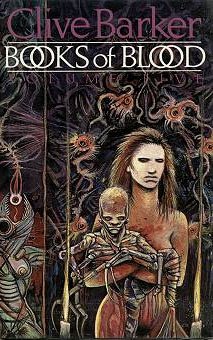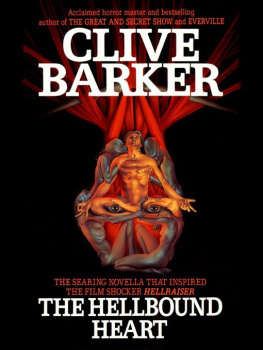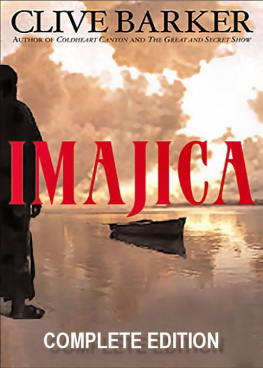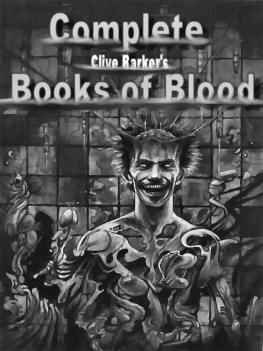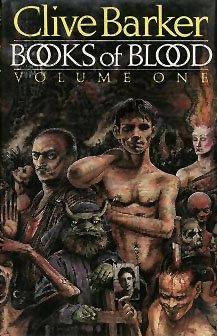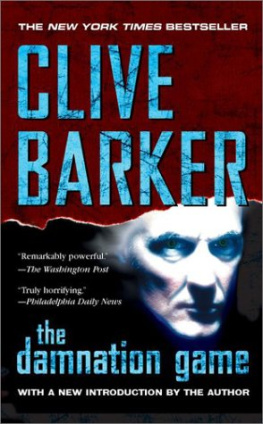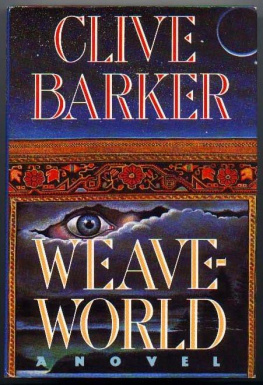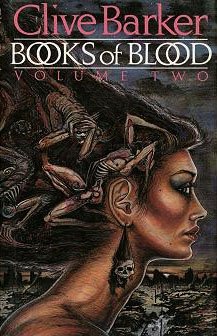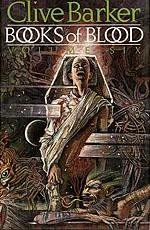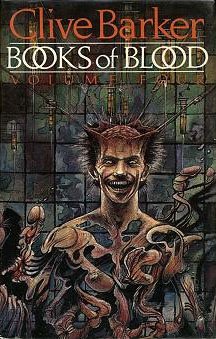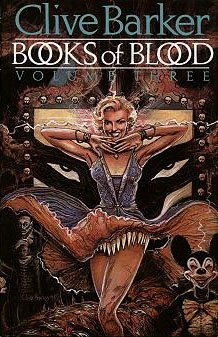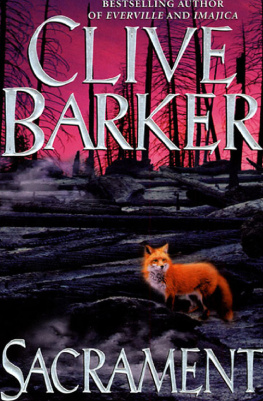Clive Barker - Books of Blood Vol 5
Here you can read online Clive Barker - Books of Blood Vol 5 full text of the book (entire story) in english for free. Download pdf and epub, get meaning, cover and reviews about this ebook. genre: Science fiction. Description of the work, (preface) as well as reviews are available. Best literature library LitArk.com created for fans of good reading and offers a wide selection of genres:
Romance novel
Science fiction
Adventure
Detective
Science
History
Home and family
Prose
Art
Politics
Computer
Non-fiction
Religion
Business
Children
Humor
Choose a favorite category and find really read worthwhile books. Enjoy immersion in the world of imagination, feel the emotions of the characters or learn something new for yourself, make an fascinating discovery.
- Book:Books of Blood Vol 5
- Author:
- Genre:
- Rating:4 / 5
- Favourites:Add to favourites
- Your mark:
- 80
- 1
- 2
- 3
- 4
- 5
Books of Blood Vol 5: summary, description and annotation
We offer to read an annotation, description, summary or preface (depends on what the author of the book "Books of Blood Vol 5" wrote himself). If you haven't found the necessary information about the book — write in the comments, we will try to find it.
Books of Blood Vol 5 — read online for free the complete book (whole text) full work
Below is the text of the book, divided by pages. System saving the place of the last page read, allows you to conveniently read the book "Books of Blood Vol 5" online for free, without having to search again every time where you left off. Put a bookmark, and you can go to the page where you finished reading at any time.
Font size:
Interval:
Bookmark:
Clive Barker
Books of Blood Vol 5
The Forbidden
Like a flawless tragedy, the elegance of which structure is lost upon those suffering in it, the perfect geometry of the Spector Street Estate was only visible from the air. Walking in its drear canyons, passing through its grimy corridors from one grey concrete rectangle to the next, there was little to seduce the eye or stimulate the imagination. What few saplings had been planted in the quadrangles had long since been mutilated or uprooted; the grass, though tall, resolutely refused a healthy green.
No doubt the estate and its two companion developments had once been an architect's dream. No doubt the city-planners had wept with pleasure at a design which housed three and thirty-six persons per hectare, and still boasted space for a children's playground. Doubtless fortunes and reputations had been built upon Spector Street, and at its opening fine words had been spoken of its being a yardstick by which all future developments would be measured. But the planners - tears wept, words spoken - had left the estate to its own devices; the architects occupied restored Georgian houses at the other end of the city, and probably never set foot here.
They would not have been shamed by the deterioration of the estate even if they had. Their brain-child (they would doubtless argue) was as brilliant as ever: its geometries as precise, its ratios as calculated; it was people who had spoiled Spector Street. Nor would they have been wrong in such an accusation. Helen had seldom seen an inner city environment so comprehensively vandalized. Lamps bad been shattered and back-yard fences overthrown; cars whose wheels and engines had been removed and chassis then burned, blocked garage facilities. In one courtyard three or four ground-floor maisonettes had been entirely gutted by fire, their windows and doors boarded up with planks and corrugated iron.
More startling still was the graffiti. That was what she had come here to see, encouraged by Archie's talk of the place, and she was not disappointed. It was difficult to believe, staring at the multiple layers of designs, names, obscenities, and dogmas that were scrawled and sprayed on every available brick, that Spector Street was barely three and a half years old. The walls, so recently virgin, were now so profoundly defaced that the Council Cleaning Department could never hope to return them to their former condition. A layer of whitewash to cancel this visual cacophony would only offer the scribes a fresh and yet more tempting surface on which to make their mark.
Helen was in seventh heaven. Every corner she turned offered some fresh material for her thesis: 'Graffiti: the semiotics of urban despair'. It was a subject which married her two favourite disciplines - sociology and aesthetics - and as she wandered around the estate she began to wonder if there wasn't a book, in addition to her thesis, in the subject. She walked from courtyard to courtyard, copying down a large number of the more interesting scrawlings, and noting their location. Then she went back to the car to collect her camera and tripod and returned to the most fertile of the areas, to make a thorough visual record of the walls.
It was a chilly business. She was not an expert photographer, and the late October sky was in full flight, shifting the light on the bricks from one moment to the next. As she adjusted and re-adjusted the exposure to compensate for the light changes, her fingers steadily became clumsier, her temper correspondingly thinner. But she struggled on, the idle curiosity of passers-by notwithstanding. There were so many designs to document. She reminded herself that her present discomfort would be amply repaid when she showed the slides to Trevor, whose doubt of the project's validity had been perfectly apparent from the beginning.
'The writing on the wall?' he'd said, half smiling in that irritating fashion of his, 'It's been done a hundred times.'
This was true, of course; and yet not. There certainly were learned works on graffiti, chock full of sociological jargon: cultural disenfranchisement; urban alienation. But she flattered herself that she might find something amongst this litter of scrawlings that previous analysts had not: some unifying convention perhaps, that she could use as the lynch-pin of her thesis. Only a vigorous cataloguing and cross-referencing of the phrases and images before her would reveal such a correspondence; hence the importance of this photographic study. So many hands had worked here; so many minds left their mark, however casually: if she could find some pattern, some predominant motive, or motif, the thesis would be guaranteed some serious attention, and so, in turn, would she.
'What are you doing?' a voice from behind her asked.
She turned from her calculations to see a young woman with a pushchair on the pavement behind her. She looked weary, Helen thought, and pinched by the cold. The child in the pushchair was mewling, his grimy fingers clutching an orange lollipop and the wrapping from a chocolate bar. The bulk of the chocolate, and the remains of previous jujubes, was displayed down the front of his coat.
Helen offered a thin smile to the woman; she looked in need of it.
'I'm photographing the walls,' she said in answer to the initial enquiry, though surely this was perfectly apparent.
The woman - she could barely be twenty - Helen judged, said:
'You mean the filth?'
'The writing and the pictures,' Helen said. Then: 'Yes. The filth.'
'You from the Council?'
'No, the University.'
'It's bloody disgusting,' the woman said. 'The way they do that. It's not just kids, either.'
'No?'
'Grown men. Grown men, too. They don't give a damn. Do it in broad daylight. You see 'em... broad daylight.' She glanced down at the child, who was sharpening his lollipop on the ground. 'Kerry!' she snapped, but the boy took no notice. 'Are they going to wipe it off?' she asked Helen.
'I don't know,' Helen said, and reiterated: 'I'm from the University.'
'Oh,' the woman replied, as if this was new information, 'so you're nothing to do with the Council?'
'No.'
'Some of it's obscene, isn't it?; really dirty. Makes me embarrassed to see some of the things they draw.'
Helen nodded, casting an eye at the boy in the pushchair. Kerry had decided to put his sweet in his ear for safe-keeping.
'Don't do that!' his mother told him, and leaned over to slap the child's hand. The blow, which was negligible, began the child bawling. Helen took the opportunity to return to her camera. But the woman still desired to talk. 'It's not just on the outside, neither,' she commented.
'I beg your pardon?' Helen said.
'They break into the flats when they go empty. The Council tried to board them up, but it does no good. They break in anyway. Use them as toilets, and write more filth on the walls. They light fires too. Then nobody can move back in.'
The description piqued Helen's curiosity. Would the graffiti on the inside walls be substantially different from the public displays? It was certainly worth an investigation.
'Are there any places you know of around here like that?'
'Empty flats, you mean?'
'With graffiti.'
'Just by us, there's one or two,' the woman volunteered. 'I'm in Butts' Court.'
'Maybe you could show me?' Helen asked.
The woman shrugged.
'By the way, my name's Helen Buchanan.'
'Anne-Marie,' the mother replied.
'I'd be very grateful if you could point me to one of those empty flats.'
Anne-Marie was baffled by Helen's enthusiasm, and made no attempt to disguise it, but she shrugged again and said: 'There's nothing much to see. Only more of the same stuff.'
Helen gathered up her equipment and they walked side by side through the intersecting corridors between one square and the next. Though the estate was low-rise, each court only five storeys high, the effect of each quadrangle was horribly claustrophobic. The walkways and staircases were a thief's dream, rife with blind 'corners and ill-lit tunnels. The rubbish-dumping facilities - chutes from the upper floors down which bags of refuse could be pitched - had long since been sealed up, thanks to their efficiency as fire-traps. Now plastic bags of refuse were piled high in the corridors, many torn open by roaming dogs, their contents strewn across the ground. The smell, even in the cold weather, was unpleasant. In high summer it must have been overpowering.
Font size:
Interval:
Bookmark:
Similar books «Books of Blood Vol 5»
Look at similar books to Books of Blood Vol 5. We have selected literature similar in name and meaning in the hope of providing readers with more options to find new, interesting, not yet read works.
Discussion, reviews of the book Books of Blood Vol 5 and just readers' own opinions. Leave your comments, write what you think about the work, its meaning or the main characters. Specify what exactly you liked and what you didn't like, and why you think so.

